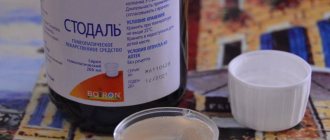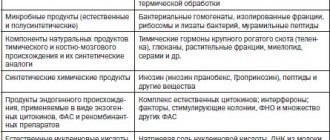Contraindications and adverse reactions
You should avoid taking the drug in the form of drops in the following cases:
- epilepsy;
- liver diseases;
- brain diseases;
- alcoholism;
- period of lactation and childbearing.
The drug in tablets is contraindicated in the following cases:
- allergy to fructose and galactose;
- sucrase and lactase deficiency.
Taking the drug in any form is contraindicated in the presence of increased susceptibility to the constituent components. Do not give to children under 2 years of age (tablets up to 6 years of age).
In rare cases, after taking the drug, undesirable reactions from the digestive system may occur - pain in the abdominal area, vomiting, nausea. Allergies may also manifest themselves in the form of redness, itching and rashes on the skin. It is extremely rare that an allergic reaction is accompanied by shortness of breath and swelling of the face.
To date, no cases of drug overdose have been recorded.
For children
Sinupret effectively relieves symptoms of respiratory tract diseases accompanied by inflammation. But it is worth remembering that the effectiveness of treatment largely depends on diagnosis and clearly followed instructions for use. Especially when Sinupret is prescribed to a child. So, drops are contraindicated for children under 2 years of age. And the pills are for children under 6 years old. For children from 2 to 10 years old, pediatricians and ENT specialists recommend Sinupret in the form of a syrup with a lower alcohol content. It is designed specifically for children.
Is it possible to take Sinupret during pregnancy?
Pregnant women can take the drug only as prescribed by their attending physician. In the 1st trimester, the drug is strictly contraindicated. Preference should be given to the drug in tablet form, since the drops contain alcohol. If any adverse reactions occur, you should immediately stop taking the medicine and tell your doctor.
During breastfeeding, it is better to refrain from taking Sinupret, since there is no clinical data on the possibility of penetration of the active components into breast milk.
Analogs
Sinupret, containing a complex of medicinal herbs, is a combination drug. This combination naturally has no structural analogues on the pharmacological market. The pharmacy offers products with a similar therapeutic effect: Tonsilgon. They may have a similar effect, but it is worth remembering that any medicine has not only contraindications and dosage regimen, but also the risk of adverse reactions from the body. Be sure to visit a doctor!
Analogues of the drug Sinupret
For example, Sinupret and Sinupret Forte differ in the duration of exposure and therapeutic effect. Sinupret Forte lasts longer.
Sinupret/Cinnabsin
Cinnabsin, like Sinupret, is used for the therapeutic treatment of sinusitis and sinusitis in acute and chronic forms. But it should not be taken by children under 3 years of age. Cinnabsin is effective as an immunostimulating agent.
Sinupret/Korisalia
Corysalia is a homeopathic medicine that reduces the intensity of inflammatory reactions, reduces rhinorrhea, sneezing, swelling and hyperemia.
Corizalia is prescribed for the symptomatic treatment of rhinitis in adults and children over 2 years of age.
Sinupret/Aflubin
Aflubin is used in the treatment of acute respiratory infections and influenza. Unlike Sinupret, it has fewer contraindications and is easier to tolerate.
Sinupret/Tonsilgon
Tonsilgon is used more widely than Sinupret. So, in addition to the treatment of sinusitis, Tonsilgon is prescribed for throat diseases (tonsillitis, laryngitis, etc.). Unlike Sinupret, Tonsilgon is prescribed to children over 1 year of age. Before replacing Sinupret with an analogue, you should consult a specialist.
Reviews of Sinupret
Those reviews about Sinupret for children that parents leave online are mostly positive. Users write that the product helps children with sinusitis , relieving acute symptoms within a few days.
Reviews of Sinupret drops, as well as reviews of Sinupret tablets, indicate that the medicine helps relieve nasal congestion and reduce the severity of swelling. It is noted that the remedy is often effective without concomitant treatment with antibiotics .
Another positive is that Sinupret tablets can be used during pregnancy. Pediatricians (Komarovsky and others) write that this remedy is non-toxic and safe.
special instructions
It should be taken into account that the product contains ethanol , 16.0-19.0% of the volume.
When preparing drops for oral administration, you should hold the bottle vertically and shake it beforehand.
Please note that drops cannot be instilled into the nose.
Before taking Sinupret tablets for sinusitis , people with diabetes should take into account that 1 tablet contains less than 0.03 XE.
The ability to drive vehicles or operate precision machinery is not affected.
Inhalations with Sinupret for children are sometimes practiced When using this inhalation product, it is important to consult your pediatrician.
Compound
Sinupret contains mainly natural ingredients. Its composition, depending on the dosage form, includes extracts of primrose, gentian, sorrel, elderberry and verbena.
Gelatin, sorbitol, starch, stearic acid and some other substances are used as auxiliary components contained in the tablets.
The drop form of the drug contains 20 percent ethyl alcohol, and the syrup contains 8 percent ethanol, sucrose, cherry flavor and maltitol.
Sinupret® drops
APPROVED Order of the Ministry of Health of Ukraine March 31, 2016 No. 288 Registration Certificate No. UA/4373/02/01
INSTRUCTIONS for medical use of the drug SINUPRET®
Composition of the medicinal product: active ingredients: 100 g of drops contain 29 g of aqueous-alcoholic extract (1:11) from gentian root (Radix Gentianae) ; primrose flowers with a calyx (Flores Рrimulae сum Сalyсіbus) ; sorrel herbs (Nerba Rumis) ; elderberry flowers (Flores Sambusi) ; verbena herbs (Herba Verbenae) (1:3:3:3:3); excipients: ethanol 19% (v/v), purified water.
Dosage form. Oral drops.
A clear or slightly cloudy liquid of yellow-brown color, bitter in taste, with an aromatic odor.
Manufacturer's name and location. Bionorica SE, Kerchensteinerstrasse 11-15, 92318 Neumarkt, Germany.
Pharmacotherapeutic group. Combined drugs that are used for coughs and colds. ATC code R05X.
The components that make up the herbal medicine have complex activity, which is manifested in secretolytic action, decongestant, anti-inflammatory, immunostimulating and antiviral effects.
The active components of Sinupret® inhibit the reproduction of various respiratory viruses, such as influenza A virus, parainfluenza and RSV (respiratory syncytial viruses).
Under the influence of the drug, secretion is regulated and tissue swelling is reduced. Drainage and ventilation of the paranasal sinuses are restored, nasal congestion is eliminated, and the protective function of the respiratory tract epithelium is normalized. The effectiveness of antibiotic therapy increases.
Indications for use. Acute and chronic inflammation of the paranasal sinuses.
Contraindications. Increased individual sensitivity to any of the active or auxiliary substances of the drug, as well as increased sensitivity to other types of primrose.
Safety precautions for use. This medicinal product contains ethanol 19.0% (v/v). During storage of the drug, turbidity or precipitation may occur, but this does not affect the effect of the drug. Shake before use.
If symptoms of the disease do not disappear after 7-14 days or recur periodically, you should consult a doctor.
Special instructions.
Use during pregnancy or breastfeeding. During pregnancy or breastfeeding, the drug can be used after consultation with a doctor in cases where the benefit of use outweighs the potential risk to the fetus/child.
The ability to influence the reaction speed when driving a vehicle or a robot with other mechanisms. At recommended doses, the drug does not affect the ability to drive vehicles or operate other machinery, but it should be taken into account that the drug contains ethanol.
Children. Due to insufficient experience with use, the drug should not be used in children under 2 years of age.
Method of administration and dose.
Unless the doctor prescribes otherwise, the drug is used in the following doses:
| Age | Single dose | Daily dose |
| Children aged 2 to 5 years | 15 drops each, equivalent to 0.9 ml | 45 drops (3 times 15 drops), equivalent to 2.7 ml |
| Children aged 6 to 11 years | 25 drops each, equivalent to 1.5 ml | 75 drops (3 times 25 drops), equivalent to 4.5 ml |
| Adults and children over 12 years of age | 50 drops each, equivalent to 3 ml | 150 drops (3 times 50 drops), equivalent to 9 ml |
The usual recommended course of treatment is 7-14 days. Adults take the drops, as a rule, undiluted. For children, drops should be added to juice or tea.
Overdose. At the moment, cases of intoxication are unknown. If the dose is exceeded, the manifestation of these adverse reactions may increase.
Treatment of intoxication: if signs of poisoning or overdose occur, symptomatic therapy is necessary.
Side effects. Gastrointestinal disorders (stomach pain, nausea, vomiting) are sometimes observed. Reactions of hypersensitivity of the skin (rashes, redness of the skin, itching), as well as allergic reactions (Quincke's edema, buttocks, swelling of the face) rarely occur. If any adverse reactions occur, you should stop taking the drug and consult a doctor.
Interaction with other drugs and other types of interactions. No interactions with other drugs were observed. Combination with antibiotics is possible and advisable.
Best before date. 2 years. Do not use after the expiration date stated on the package. The expiration date is determined until the last day of the month of the expiration date indicated on the package.
After the first opening of the bottle, the drug is suitable for use for 3 months.
Storage conditions. Store in original packaging at a temperature not exceeding 25 °C out of the reach of children.
Package. 100 ml of solution in a bottle, placed in a cardboard package.
Advertising of a medicine. Before use, consult your doctor and be sure to read the instructions.
pharmachologic effect
The abstract indicates that the drug has secretomotor, secretolytic and anti-inflammatory effects. The complex effect of all plant components included in the composition is noted.
Verbena normalizes metabolism and improves liver condition. Acts as a tonic, analgesic, anti-inflammatory, antispasmodic, astringent. As part of the product, Sinupret thins the viscous secretion and provides an antiallergic effect.
Primrose acts as a sedative, expectorant and antispasmodic. Under its influence, secretory activity is activated, and sputum is removed faster.
Sorrel has anti-allergic, wound-healing, hemostatic, antiseptic and anti-inflammatory effects.
Black elderberry provides a diaphoretic, disinfectant, and anti-inflammatory effect. As part of the medicine, it relieves swelling of the mucous membranes.
Gentian stimulates secretion, activates bile production, and increases appetite.
Thus, a complex effect is ensured, causing the medicine to reduce the viscosity of sputum, eliminate bronchospasm, stimulate the immune system , and act as an antiviral and anti-inflammatory agent. Under its influence, nasal congestion is reduced, the process of mucus and sputum discharge is facilitated, and mucostasis is eliminated.
During the treatment, tissue swelling decreases, ventilation and drainage of the sinuses are restored. The protective function of the respiratory tract epithelium is also normalized.
When taken together, Sinupret enhances the effectiveness of antibiotic .
Dosage forms
Sinupret is produced and sold in various forms:
- Tablet form. This is the most commonly prescribed type of drug. It can be used to treat adults and children over ten years of age. The tablets must be swallowed and washed down with water in the required volume, always in their entirety, without chewing.
For the treatment of particularly severe diseases, such as sinusitis and sinusitis, therapists prescribe Sinupret Forte, which contains a higher concentration of medicinal substances.
- The drip form is an alcohol setting used for oral administration. This type of drug is characterized by greater effectiveness compared to tablets. The drops are absorbed into the blood faster and begin to act. This form can only be prescribed to adults and children over 10 years of age due to the increased concentration of ethyl alcohol in the composition.
Attention! It is prohibited to instill drops into the nose, since the medicine does not have a local therapeutic effect; on the contrary, the alcohol in its composition can cause damage to the mucous membrane and inflammation.
- Syrup. Contains a lower concentration of alcohol and is allowed for pregnant women and small children.







